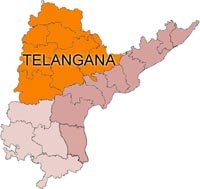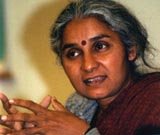
I am no fan of Arundhati Roy (but I think she is beautiful, though). If she had stuck to fiction, it would have saved me this trouble. I don’t read fiction and our worlds would not have crossed each other. She unnecessarily reads up modern age western thought books and tries to preach it to
Wars are made with “Blood, Toil, Tears and Sweat” (#) and Nations are built with ‘concrete, steel, iron, and will power’. She believes in borderless nations, dam-less rivers, and nuclear free countries. I like those concepts as well. I like a war-less world, caste-less society, race-less civilizations, malice-less neighbors, selfless taxpayers, and so on. That does not mean, I close my eyes, and start believing that’s how the world is.
Without dams, there wouldn’t have been a
Here’s one of here interviews at The Hindu. Snippets are given below, followed by my comments.
1. “For example, is it right to divert rivers and grow water-intensive crops like sugar cane and wheat in a desert ecology?”
Tell that to Israelis! Their survival depends on it. A country like
Many people shout- ‘Save Earth!’ They don’t realize that Earth will save itself, no matter what! It has done again and again in the last four billion years. It has induced Ice Ages and long summers many a times in its history to adjust climates, and in the process, losing dinosaurs and 99% of species that ever appeared on this planet, and it will keep on surviving long after mankind vanishes from its face. They should in fact shout- ‘Save Mankind!’ because we may not be able to adjust to the changing climate and have to go bust.
Some of civilizations were wiped out because they didn’t control the floods and droughts and not because they built dams.
2. “It touches a raw nerve, so you have people who know very little about it, people who admit that they know very little and don’t care to find out, coming out with passionate opinions.”
The problem with opinions is that- they are like assholes; everyone has one (its the same quote I use at the top of by blog). I think the same way about her- that she knows too little about it, and that her opinions are borrowed and misplaced in time and place. The luxury of not having a dam is something
3. “…the really vital questions that have not been answered are the ones that question the benefits of dams.”
‘Now, my dear madam, read history! And if you don’t have much time, just read, Jared Diamond’s Collapse!' – was my initial reaction. But she actually she did! She says-“I recommend Jared Diamond’s wonderful book Collapse to all those who wish to take a slightly longer, and less panicked, view of ‘development’”. And she conveniently uses it as an argument for her case. That’s the problem with some fundamental ideas. They can be used by both the opposing parties to further their argument (like me doing here for ‘development’).
Many civilizations got swept away because they could not adjust to the changing climate and natural conditions- including flooding and droughts of many rivers. The civilization became stable only when those civilizations could tame these rivers by building dams. This point is mooted by Jared Diamond in a different context and that is conveniently NOT taken up by Arundhati Roy. In another instance, he talks about how tribals or jungle folks living in so-called ‘harmony’ with nature can actually create situations innocuously by which they get extinct. For example, gathering sticks from the forest for firewood which starts off quite harmlessly can have dangerous consequences when the rate at which the sticks fall from the tree is lower than the consumption rate of that tribals because it may trigger massive denudation of the forests leading to extinction of that tribe. Sometimes, ‘development’ can save that civilization by fencing off forests, and providing alternate method for those tribals to lit fire. Dams have been vital part of our civilization- many rivers in monsoon climates, swell, shrink, meander and take a different route, and this can lead to death of a civilization (as it happened to Indus Civilization when Indus started meandering away from the inhabited towns and cities).
May be, what she is referring to is the ‘big dams’ instead of just dams. Yes, big dams are very disruptive and cause changes to nature. But we can’t stop making dams. The
4. “Even vast parts of the command area of our favourite dam – the Bhakra is water-logged and in deep trouble.”
There are some negative effects to everything we build. One should weigh the positives against negatives. Is there ‘deep trouble’ in
If Medha Patkar and Arundhati Roy were alive during those days of this dam’s construction, we would not have that dam, and we wouldn’t have the food to eat as well- which is of course irrelevant to these women.
5. “The tragedy is that if they would only use more local, effective, rainwater harvesting schemes, for less than 10 per cent of the cost of the Sardar Sarovar, every single village in
Rain harvesting should be encouraged, but it will never give the reliable sou
All in all, her argument is fa
Making sure the environment doesn’t get affected badly is our duty, and we have to take extra precautions to do that, not stop development. People benefit from infrastructure on the long run, though some people may suffer briefly- and that is true for any project anywhere on the planet. And that, for some reason, Arundhati Roy fails to understand- because she opposes ‘development’ in all forms. May be, she would like us all to go back to caves- which is not a bad idea, because then, all we could do is hunt, make war, eat meat, drink beer, and have sex!
(#) Quote from Winston Chu








